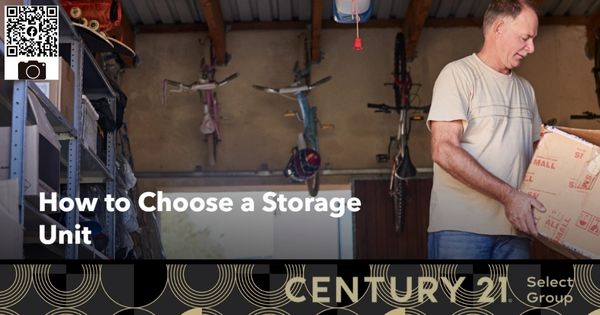How to Choose a Storage Unit
If you’re trying to reduce the clutter inside your home or getting ready to move, a storage unit can be a helpful asset. There are options to choose from that can house everything from a few boxes of clothes and knick-knacks to appliances and cars. However, choosing between these options can be overwhelming. Use this guide to help you find the right storage unit for your possessions.

Types of storage
There are generally two types of storage units: self-storage and full-service. Each has its pros and cons to consider.
- Self-storage: This is the most popular storage unit option, and you’ll find both indoor and outdoor facilities. You’re responsible for moving your items and placing them in your unit, but you will have access to your items whenever you want. Self-storage units often offer month-to-month billing, making it an excellent short-term option.
- Full-service: If you’re looking for a hands-off experience, this could be a good option for you. These companies pick your items up from your home and store them in their facility—they may even provide you with boxes. You schedule both the pick-up and drop-off times, and the company will provide you with a storage list so you know what exactly you have stored. However, this convenience often comes with higher fees. You also won’t be able to visit the storage site to retrieve items, but you may collect items by giving the company proper notice. There may also be a minimum storage term that could last several months.

Size
Most companies offer storage units in a variety of sizes. These can range from 5×5, which is perfect for a few boxes, a desk, or a small chair, up to 10×30, which can hold the contents of a three- or four-bedroom home. Other popular sizes and how much they can hold include:
- 5×10: two medium to large pieces of furniture and boxes
- 5×15: bedroom furniture and boxes
- 10×10: small apartment
- 10×15: two-bedroom home
- 10×20: two- to three-bedroom home
If you have difficulty judging how your items will fit in a space, take some painter’s tape and mark off the measurement on the ground in an open area like your garage, basement, or driveway. You can then add empty boxes and a couple items to see how they fit. Go with the larger unit if you feel you’re between two sizes—this will help protect your belongings and help keep you safe when stacking and moving items. Also, before you pack up belongings to take to a storage unit, consider going through them to see if you can donate or throw anything away. You may be able to get a smaller unit, saving you money every month.
Location
If you need regular access to your storage unit, make sure you choose a facility close to your home. Depending on where you live, this convenience can come with an additional cost as storage units in urban areas may cost more. If you don’t need quick access to your possessions, you may be able to save money with a unit located outside the center of town.

Other considerations
Don’t forget to consider these options that will impact the safety and convenience of storing your items.
Climate control
Some storage facilities provide heat and air-conditioning for your unit. These types of units also help protect your items from mildew and mold. If you’re storing items with significant financial or emotional value, you should err on the side of caution and go with a climate-controlled unit. Also, if you plan to visit the storage unit regularly in cold or hot weather, you may prefer the luxury of a climate-controlled unit.
Security
Visit the storage facility before you pay to store your items there so you can familiarize yourself with the security features. Security options in storage facilities may include perimeter fencing, video surveillance, electronic access, ample lighting, and locks. The management team of a storage facility can inform you of their specific security features.
Access hours
If you need regular access to your items, confirm that the facility allows you to access your unit on the weekends or has 24-hour access.
Insurance
You’ll likely need insurance coverage to store your items in a storage unit. Many storage companies offer in-house insurance protection that will be added to your monthly bill. You can also check with your insurance company to confirm your items in a storage unit are covered by your homeowners or renters insurance. If not, you may be able to update your policy to protect your stored items.
If you’re renting a storage unit as part of a move, check out these helpful moving tips that can save you time and money.
By Nathan Smith





